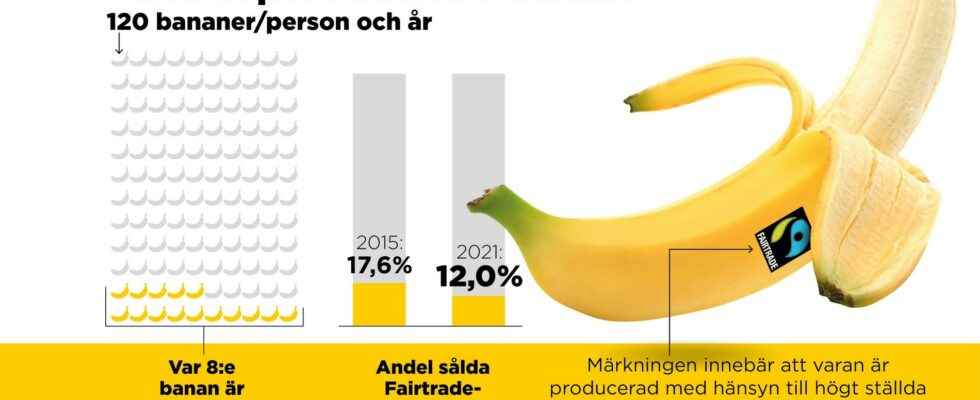full screen
Next
Sales of Fairtrade-labeled bananas are increasing globally, but in Sweden it is declining.
1 of 2Photo: Johan Hallnäs / TT
The exposure of people who grow bananas is increasing. But Swedes are increasingly choosing to buy bananas grown under fair conditions, shows a new report from Fairtrade Sweden.
– The situation has been really bad for a long time, but it is getting worse right now, says Secretary General Hewan Temesghen.
In Sweden, an average of 120 bananas are eaten per person every year.
– Bananas are a classic lure that is sold at a low price to lure us consumers into the stores. The grocery trade pushes prices against suppliers and producers, which means that the situation worsens for the people who are already in a vulnerable situation, says Hewan Temesghen.
Last year, import prices of bananas fell to the lowest level in ten years, below ten euros for a box. At the same time, the cost of, for example, fuel, fertilizer and packaging materials has increased.
– It will be an impossible economic equation where the income does not always even cover the production cost. This in turn exacerbates a number of human rights and environmental problems.
Escalating problems
The poor working conditions include low wages, long working days without breaks, discrimination against seasonal and migrant employees and obstacles to union involvement. In addition, employees often face health risks due to the extensive use of pesticides.
The problems have been known for many years but have now escalated, says Hewan Temesghen.
At the same time, sales of Faritrade-labeled bananas are declining in Sweden – despite increasing globally. Last year, a total of 165,000 tonnes of bananas were sold in Sweden. About 12 percent of them were Fairtrade-labeled. Two years earlier, in 2019, the proportion of Fairtrade-labeled bananas was about 17 percent.
– One may ask why we in Sweden, which is at the forefront of many sustainability issues, have a negative trend when it comes to just decent bananas, says Hewan Temesghen.
Want to see investments
She believes that food chains need to take greater responsibility and wants to see more investments in Fairtrade-labeled bananas, something that has been done in France and the UK, for example.
– When the grocery chains make an active decision, things happen. We saw this, for example, in Fairtrade-labeled roses, where the grocery trade has made a commitment. There we immediately noticed that it contributed to increased sales. We would like to see a similar commitment when it comes to bananas.
Hewan Temesghen also highlights public procurement in the country’s municipalities, regions and government agencies as an area for improvement.
– What if all the bananas that are bought for preschools and schools were grown in a way that protects both people and the environment. That would make a big difference, she says.
Facts
Fairtrade
Fairtrade is an international certification of raw materials grown in countries with widespread poverty. The certification means that the product is produced with regard to social, economic and environmental requirements.
For bananas, this means, among other things, a better payment to the banana producers. There are also requirements for parental leave, the right to overtime pay and union organization. There is also a ban on, for example, deforestation and dangerous chemicals.
In early 2022, Fairtrade raised the minimum price of bananas. In July 2021, they also introduced a basic salary for employees on banana plantations.
Source: Fairtrade
Read more
